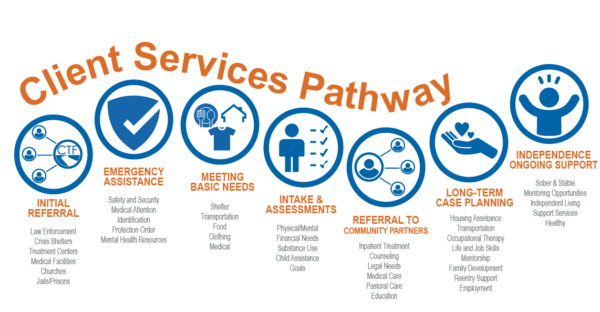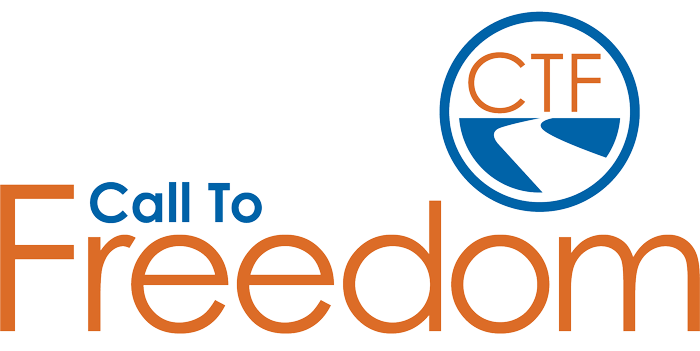Clinical Services Pathway: Referral to Community Partners
“Carry each other’s burdens, and in this way, you will fulfill the law of Christ.”- Galatians 6:2
The fifth step in CTF’s Client Services Pathway is Referral to Community Partners. This step includes referrals for numerous essential services including inpatient treatment, counseling, legal needs, medical needs, mentorship, and education. In this stage, Call to Freedom engages with organizations in the community to help provide critical resources for survivors. The saying, “It takes a village” best describes CTF’s approach to serving clients, as each individual has complex and wide-ranging needs, often far more than one organization could possibly provide alone. CTF works in partnership with fellow community-based service providers to meet each client’s needs, ensuring resources are unduplicated and clients receive comprehensive support.
Since its founding in 2016, Call to Freedom has served over 1,300 survivors of human trafficking and commercial sexual exploitation. This wouldn’t have been possible without the support, contributions, and investment of numerous local partners within the Sioux Falls community and across the state of South Dakota.

According to McKenzie, Director of Marissa’s House & Outreach Services for Call to Freedom, CTF partners with many organizations within South Dakota. If clients need inpatient treatment for substance use disorder or counseling, CTF refers them to community partners who are equipped to provide licensed, appropriate care. CTF works in partnership with legal advocacy nonprofits, to connect clients with attorneys and coordinate pro bono services where possible. Clients in need of medical care are connected with local healthcare systems, and CTF may assist with transportation to appointments and medical accompaniment. CTF’s Spirituality and Mentor Coordinator provides clients with spiritual guidance as desired and helps them connect with local churches or spiritual groups. CTF assists with clients’ education needs by helping with applications, getting grants and financial assistance for schooling, and assistance with obtaining a GED. McKenzie shares, “We have clients at various stages of success, and it all depends on the individual client’s goals.”
As one might imagine, there is a tremendous need for counseling. PTSD is prevalent among overcomers of trafficking and exploitation. Mary, CTF’s Survivor Service & Program Coordinator, says it can be challenging for clients to think of the future. “Usually, you are in survival mode just trying to get through the day. Clients have no sense of what is normal.” By coordinating referrals to community partners, including for counseling and psychiatric services, CTF helps ensure that clients receive the services and care they need.
CTF’s President & CEO Becky Rasmussen says she tries to look at the “big picture” or a high-level view. Community partners are essential in order to provide the services necessary to help survivors recover and go on to live healthy lives. “We firmly believe that no single organization has all the answers and resources necessary to meaningfully combat human trafficking. We need each other, and collaboration drives the heart of our work. We’re grateful to have so many wonderful organizations across the state able to provide key direct services to survivors, including medical care, housing, counseling, and legal support. The last thing we want to do is tell a survivor, ‘We don’t do that; call this number.’ Survivors are often bounced around from system to system. By having such strong relationships with community partners and doing the work to coordinate the referrals and provide warm-handoffs, we’re elevating the standard of care and improving survivors’ long-term outcomes.”
If you or someone you know needs Call to Freedom’s services, please call (605) 759-3565.
Written By:
Kelly Hanzlik & Rachel Schartz, Director of Grant Management
References:

